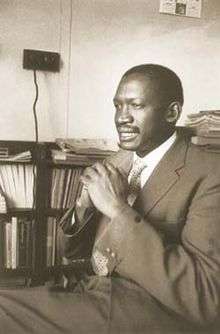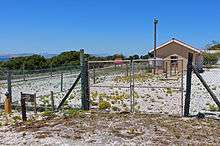Robert Sobukwe
Robert Mangaliso Sobukwe (5 December 1924 – 27 February 1978) was a prominent South African political dissident and teacher,[1] who founded the Pan Africanist Congress in opposition to the South African apartheid system.
Robert Sobukwe | |
|---|---|
 "Africa for Africans" | |
| President of the Pan Africanist Congress | |
| In office 6 April 1959 – 1963 | |
| Succeeded by | Potlako Leballo |
| Personal details | |
| Born | 5 December 1924 Graaff-Reinet, Cape Province, Union of South Africa |
| Died | 27 February 1978 (aged 53) Kimberley, Cape Province, South Africa |
| Political party | Pan Africanist Congress |
| Spouse(s) | Veronica Sobukwe |
| Residence | Kimberley, Cape Province, South Africa |
| Alma mater | University of Fort Hare University of London |
| Occupation | Teacher and lawyer |
| Part of a series on |
| Apartheid |
|---|
|
|
People
|
|
Places
|
|

During his lifetime, Sobukwe was considered to be so dangerous by the National Party government that its parliament enacted the "Sobukwe clause", a statute which on its face seemed to grant broadly applicable powers, but was specifically intended to authorise the arbitrary extension of Sobukwe's imprisonment.
Early years
Sobukwe was born in Graaff-Reinet in the Cape Province on 5 December 1924.[2] The youngest of six children,[3] he came from a poor household and was educated locally. He attended a Methodist college at Healdtown and later Fort Hare University where he joined the African National Congress Youth League (ANCYL) in 1948 and was elected president of the Student Representative Council (SRC).[4]:420
Mainstream politics
In 1952, Sobukwe achieved notoriety backing the Defiance Campaign. He identified with the Africanists within the African National Congress (ANC) and in 1957 left the ANC to become editor of The Africanist newspaper in Johannesburg.
He was a strong believer in an Africanist future for South Africa and rejected any model suggesting working with anyone other than Africans, defining African as anyone who lives in and pays his allegiance to Africa and who is prepared to subject himself to African majority rule. He later left the ANC to form the Pan Africanist Congress (PAC), and was elected its first President in 1959.[4]:421
Sobukwe became known as the Professor or simply "Prof" to his close comrades and followers, a testament to his educational achievements and powers of speech and persuasion. He spoke of the need for black South Africans to "liberate themselves" without the help of non-Africans. He defined non-Africans as anyone who lives in Africa or abroad Africa and who does not pay his allegiance to Africa and who is not prepared to subject himself to African majority rule. His strong convictions and active resistance inspired many other individuals and organisations involved in the anti-apartheid movement, notably the Black Consciousness Movement.
At Fort Hare, where generations of young Black South Africans were exposed to politics, he joined the African National Congress Youth League (ANCYL) in 1948. The organisation had been established on the university campus by Godfrey Pitje, who later became its president. In 1949, Sobukwe was elected as the first president of the Fort Hare Students' Representative Council, where he proved himself to be a good orator.
In 1950, Sobukwe was appointed as a teacher at a high school in Standerton, a position he lost when he spoke out in favour of the Defiance Campaign in 1952. He was, however, reinstated. During this period he was not directly involved with mainstream ANC activities, but still held the position of secretary of the organisation's branch in Standerton.
In 1954, after moving to Johannesburg Sobukwe became a lecturer of African Studies at the University of the Witwatersrand.[3] During his time in Johannesburg he edited The Africanist newspaper and soon began to criticise the ANC for allowing itself to be dominated by what he termed "liberal-left-multi-racialists". He strongly believed in non-racialism. He was an ardent supporter of Africanist views about liberation in South Africa and rejected the idea of working with Whites.
Sobukwe also argued that whites should be excluded from the ANC as it was impossible to have a relationship between blacks and whites until further progress had been made. He argued that a reliance on whites would disempower the realization that many of these Africans had, that they had the power to overtake a society that had been taken from them. The fight in the ANC was brutal, causing a fair amount of violence which lead to the creation of the Pan-Africanist Congress. PAC excluded white men. A goal of PAC was to get rid of the servant mentality through the identification of other African Nationalist movements and through, what they called it, "self-identification". To know that there were others out, trying to achieve the same things, gave the Africanists a real sense of power and unification. This sense of unification and power would end in 1960 in the town of Sharpville. A protest by PAC would become a police massacre. In the massacre sixty-nine people were killed and Sobukwe was taken without a fair trial in addition to both the ANC and PAC being banned. Other organizations were inspired by the actions of Sobukwe.
Internment
On 21 March 1960, the PAC led a nationwide protest against the hated Pass Law which required black people to carry a pass book at all times. Sobukwe led a march to the local police station at Orlando, Soweto, in order to openly defy the laws.[3] He was joined en route by a few followers and, after presenting his pass to a police officer, he purposely made himself guilty under the terms of the Pass Law of being present in a region/area other than that allowed as per his papers. In a similar protest on the same day in Sharpeville, police opened fire on a crowd of PAC supporters, killing 69 in the Sharpeville Massacre.
Following his arrest, Sobukwe was charged with and convicted of incitement, and sentenced to three years in prison. After serving his sentence, he was interned on Robben Island. The new General Law Amendment Act was passed, allowing his imprisonment to be renewed annually at the discretion of the Minister of Justice. This procedure became known as the "Sobukwe clause" and went on for a further three years. Sobukwe was the only person imprisoned under this clause.
Robben Island imprisonment
Sobukwe was kept in solitary confinement but permitted certain privileges including books, newspapers, civilian clothes, bread, etc. He lived in a separate area on the island where he was strictly prohibited from contact with other prisoners. His only contacts with them were through his secret hand signals while outside for exercise. Despite this, he succeeded in giving his approval to the external PAC to adopt a Maoist political program. He studied during this time and received (among others) a degree in economics from the University of London.
It is speculated that Sobukwe was subjected to this special treatment because the South African government had profiled him as a greater troublemaker than the regular ANC prisoners. Sobukwe's son disputes this.[5]
Throughout his imprisonment, Sobukwe maintained communication with his friend Benjamin Pogrund who later became his biographer (Sobukwe and Apartheid, Johannesburg: J. Ball, 1990).
Kimberley: internal exile
Sobukwe was released in 1969. He was allowed to live in Kimberley with his family, but remained under house arrest. Kimberley was suggested as an area where he could not easily foster subversive activities and also a place where he could live and work, while being easily monitored by the state. He was also restricted through a banning order, which disallowed political activities.
Various restrictions barred Sobukwe from travelling overseas, thus curtailing his attempts to further his education. For this same reason, he had to turn down several positions as a teacher at various locations in the United States.
Sobukwe completed his law degree with the help of a local lawyer, in Galeshewe, and he then started his own practice in 1975 in Kimberley.
Illness and death
Due to lung cancer, Sobukwe was hospitalised in 1977. His doctors requested that the authorities allow him freedom of movement on humanitarian grounds. This request was refused indefinitely. He died on 27 February 1978, and was buried in Graaf-Reinet on 11 March 1978.
Legacy
Robert Sobukwe Street in Pretoria (formerly known as Esselen Street) is named after him.[6] Robert Sobukwe Road in Cape Town (formerly known as Modderdam Road) is named after him in June 2013.
See also
- Benjamin Pogrund, Sobukwe's biographer, who wrote, How Can Man Die Better: The Life of Robert Sobukwe.
- List of people subject to banning orders under apartheid
References
- sahoboss (17 February 2011). "Robert Sobukwe". South African History Online. Retrieved 5 August 2019.
- "Robert Mangaliso Sobukwe", South African History Online.
- "Robert Sobukwe: 'There is only one race. The human race.'" History and heritage, SouthAfrica.info.
- Maaba, Brown Bavusile (2001). "The Archives of the Pan Africanist Congress and the Black Consciousness-Orientated Movements". History in Africa. 28: 417–438. doi:10.2307/3172227. JSTOR 3172227.
- "'I don't understand his thinking' - Robert Sobukwe's son reacts to comments about his dad". News24. 13 February 2019. Retrieved 16 September 2019.
- "Pretoria's New Street Names". ShowMe™ - Pretoria. Retrieved 14 November 2018.
External links
- Robert Sobukwe - Leader of The Africanist
- Collection of historical papers on Robert Mangaliso Sobukwe at The University of the Witwatersrand Library
- Austil Mathebula, "Robert Sobukwe, a lesser known hero", The Citizen, 19 March 2015